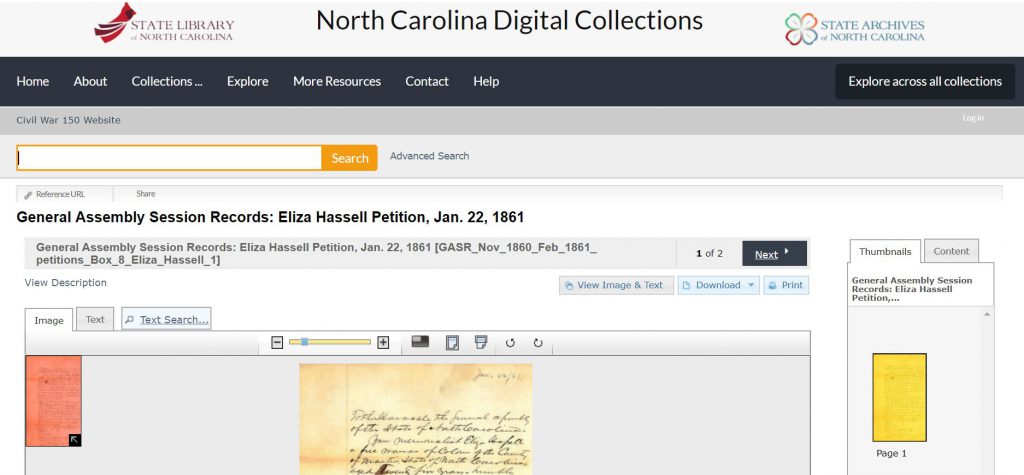After multiple class sessions introducing our archival and manuscript collections and oral history best practices, students in Dr. Nneka Dennie’s Spring 2019 AFR 329: Women & Slavery in the Black Atlantic course produced a documentary using oral histories created throughout the semester. These materials will be donated to the Archives.
In addition to this main project, students were tasked with identifying primary sources from local archives, historic sites, and/or repositories that shed light on the lived experiences of enslaved women or women enslavers. The following series of blog posts are authored by these students upon the completion of this archival research process and serve as reflective pieces.
Thank you for your submissions-and a wonderful semester of fruitful collaborations!
“Primary Source Analysis: The Choices of Freedom”
written by Idalina Pina
In the two cases presented before the General Assembly Session in Martin County in 1861, two freed-women sought to bind themselves to slavery. In the first case, the petitioner, Eliza Hassell, is described as a free-woman of color, who requested to acquiesce her freedom to Shepard R. Spruill, a character she describes as a “kind master.” Hassell, as explained by the Court, claims that her conditions under the entitlement of Spruill would change for the better. The petition does not further clarify her previous conditions but does insinuate that a life of slavery would be a better option for Hassell. Similarly, in the second petition introduced to the court the same year, Kissah Trueblood, described also as a freed woman of color, makes the same plea. Her petition follows a similar sentiment as the previous one: Trueblood sought to bind herself to Dr. Ritter to better her circumstances. The script of this petition, however, reveals more about Trueblood and her reasonings, describing her previous life under the “apprenticeship” of other owners as exceeding her current state of “destitute” as a free woman.

Both of these cases reveal a couple of interest characteristics of slavery in the mid-19th century. On the one hand, free woman consciously made the choice to bind themselves to perpetual servitude, some under the impression that a slavery would be a better outcome. This rationalization, unfortunately, was not rash; in the South, particularly in North Carolina as seen with these two cases, living conditions for free people of color were not reliable. This quality of life made freed people vulnerable to circumstances such as presented in the cases above. Both Hassell and Trueblood are described as free woman of “color,” a particular characterization by the Court that reveals more about the particular situation of these two women. Although the petition includes that Trueblood was born a free person, it does not mention Hassell’s previous position.
Their “position” in a slave society as freed women is pertinent in understanding some of these cases. As analyzed by numerous authors throughout this course, freed women held different positions in social structures which allowed some form of mobility. Both of these women were at some point free, but because freedom could not provide a means of living for them, slavery became the better choice. This “choice of freedom” is not accessible for others.
The description these women utilize for these men can expose more of the underlying conditions that lead them to make this choice; however, these women could also be using this language to further their agency, which in this case, is binding themselves to slavery because it betters their living situation. In both of these case, the women are presented to have chosen a life of slavery instead of freedom. However, their voices are not heard through the paper, but rather the intentions of the writer are what one can extrapolate from this petition; therefore, making it difficult to deduce their motives.
Works Cited:
General Assembly Session Records: Eliza Hassell Petition, Jan. 22, 1861. http://digital.ncdcr.gov/cdm/compoundobject/collection/p15012coll8/id/2218/rec/19 .
General Assembly Session Records: Kissah Trueblood Petition, Jan. 3, 1861. http://digital.ncdcr.gov/cdm/compoundobject/collection/p15012coll8/id/2215/rec/20.

Speak Your Mind